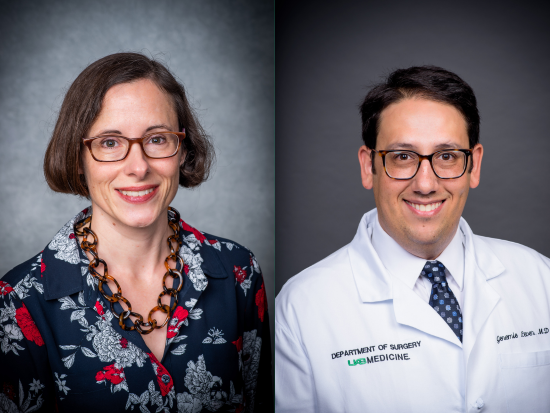 UAB General Surgery Resident Jeremie Lever, M.D., Ph.D., mentee of UAB Division of Gastrointestinal Surgery Associate Professor Karin Hardiman, M.D., Ph.D., has been awarded the Resident Research grant from the Research Foundation of the American Society of Colon and Rectal Surgeons (ASCRS) for their project entitled "The role of innate and shared ST6Gal-1 in rectal adenocarcinoma invasion."
UAB General Surgery Resident Jeremie Lever, M.D., Ph.D., mentee of UAB Division of Gastrointestinal Surgery Associate Professor Karin Hardiman, M.D., Ph.D., has been awarded the Resident Research grant from the Research Foundation of the American Society of Colon and Rectal Surgeons (ASCRS) for their project entitled "The role of innate and shared ST6Gal-1 in rectal adenocarcinoma invasion."
Lever's current research project with Hardiman aims to study how vesicle-mediated sharing of ST6Gal-1 may contribute to rectal cancer invasion and metastasis.
The Research Foundation of the ASCRS supports research and educational programs related to colorectal surgery. Over the last two decades, the research foundation has granted more than $6 million to colorectal surgery initiatives.
The award given to Hardiman and Lever specifically funds general surgery residents to support initiation of research projects and academic careers in colorectal surgery.
An alumnus of the UAB's Medical Scientist Training Program, Lever is a current general surgery resident at UAB Hospital and a research resident in Hardiman's laboratory. Dr. Lever is well-known for fundamental discoveries in macrophage-mediated inflammation after acute kidney injury and has shifted his focus to rectal cancer and glycobiology during his post-doctoral studies. “I am incredibly grateful to the ASCRS and to our Department of Surgery for their tremendous support of surgeon scientists in training,” said Lever. “I look forward to contributing to our understanding of chemoradiation treatment resistance in rectal cancer and to how we can leverage glycosylation changes in novel gastrointestinal cancer treatment.”
Hardiman is a principal investigator in her NIH-funded laboratory at UAB. She conducts basic and translational research focused on aberrant sialylation and treatment resistance mechanisms in colorectal cancer. Hardiman’s group leverages nanomedicine-based approaches to the study of the pathophysiology of rectal cancer and to the development of new therapies. The laboratory has immediate goals of providing new approaches for tumors that are resistant to classical treatment and improved outcomes for patients.